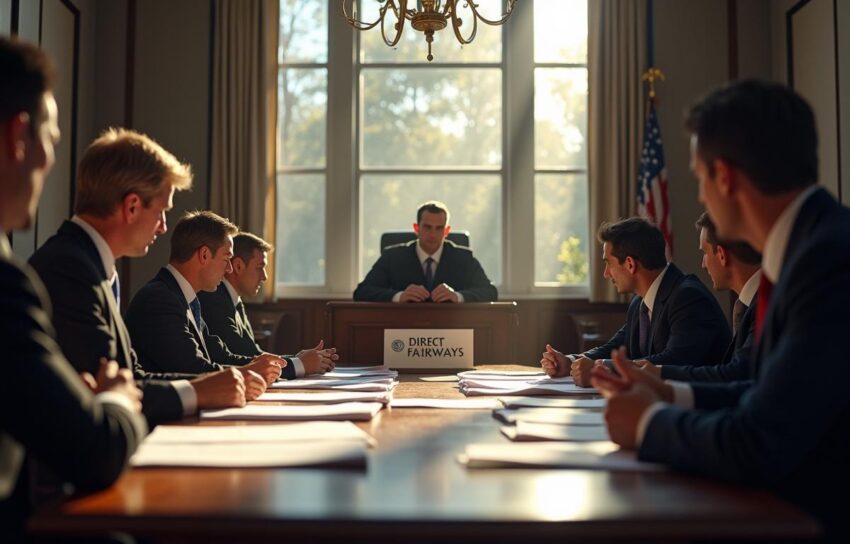Navigating the business world can sometimes feel like walking through a minefield. Companies often face scrutiny, and sometimes, this can lead to legal challenges. One such case that has captured attention involves Direct Fairways, a company known for its golf-related advertising services. The discussions surrounding a direct fairways lawsuit have raised many questions for golf course owners, advertisers, and the public. This article aims to break down the complexities of the situation, providing a clear and friendly overview of what the lawsuit entails, its implications, and what it means for those involved.
We will explore the background of the company, the nature of the allegations that led to legal action, and the perspectives of the different parties. Understanding the details can help everyone involved make more informed decisions.
Key Takeaways
- Core Allegations: The central claims in the direct fairways lawsuit often revolve around allegations of deceptive business practices and failure to deliver on contractual promises.
- Business Impact: The lawsuit has significant implications for Direct Fairways’ reputation and operations, as well as for the golf courses and small businesses that partnered with them.
- Legal Precedents: This case may set important precedents for advertising agreements and vendor contracts within the golf industry and beyond.
- Due Diligence is Crucial: For business owners, this situation highlights the absolute necessity of thoroughly vetting potential partners and carefully reviewing contracts before signing.
What is Direct Fairways?
Before diving into the legal matters, it’s important to understand what Direct Fairways does. Direct Fairways positions itself as a marketing and advertising company that primarily serves the golf industry. Their business model typically involves partnering with golf courses to produce and distribute promotional materials like scorecards, GPS advertising, and course guides.
The company’s approach is to sell advertising space on these materials to local businesses. The idea is that these businesses can reach an affluent and targeted demographic—golfers. In theory, it’s a win-win-win situation:
- The golf course gets professionally produced materials at little to no cost.
- Local businesses get exposure to potential customers.
- Direct Fairways profits from selling the ad space.
This model has been used by many companies over the years, but the execution and fulfillment of the promises made are where potential issues can arise, which seems to be at the heart of the direct fairways lawsuit discussions.
The Business Model Explained
Direct Fairways typically approaches a golf course and offers to redesign and print their scorecards or other materials for free. In exchange, Direct Fairways gains the exclusive right to sell advertising spots on those materials. Their sales team then contacts local businesses—realtors, restaurants, dentists, etc.—to sell these ad spots. The contracts signed by these advertisers are often for a specific duration, with payments made upfront or in installments. The controversy often begins when advertisers feel the promised services were not delivered as expected.
The Genesis of the Direct Fairways Lawsuit
Legal troubles for a company don’t just appear overnight. They are usually the result of a pattern of complaints and unresolved disputes. The direct fairways lawsuit is a culmination of numerous allegations brought forward by clients who felt they were wronged. These clients are primarily the small business owners who purchased advertising space, believing it would provide valuable exposure for their services.
The primary claims center on allegations of misrepresentation and breach of contract. Many advertisers have stated that the promotional materials they paid for were either never produced, not distributed as promised, or were of a much lower quality than what was presented during the sales pitch. When these business owners attempted to seek refunds or cancel their contracts, they often faced significant resistance, leading them to seek legal recourse.
Common Allegations from Plaintiffs
While each case has its own specifics, a few common themes have emerged from the complaints filed against Direct Fairways. These recurring issues form the foundation of the legal challenges the company faces.
- Non-Delivery of Services: The most frequent complaint is that the advertised-upon materials, such as scorecards, were never actually printed or delivered to the golf courses.
- Poor Quality and Distribution: In cases where materials were produced, advertisers alleged they were of poor quality or that distribution was minimal, failing to reach the promised audience.
- Misleading Sales Tactics: Many plaintiffs claim they were subjected to high-pressure and misleading sales tactics, with promises made verbally that were not reflected in the written contracts.
- Difficulty with Cancellation and Refunds: A significant point of contention is the difficulty clients faced when trying to cancel their agreements or obtain refunds after realizing the services were not being rendered as promised.
Analyzing the Core Legal Claims
In any lawsuit, the specific legal arguments are crucial. For the direct fairways lawsuit, the claims generally fall into several categories of civil law. Understanding these can help clarify what the plaintiffs are trying to prove in court.
Breach of Contract
This is perhaps the most straightforward claim. A contract is a legally binding agreement between two or more parties. When one party fails to fulfill its obligations as outlined in the contract, it’s considered a breach. In this case, advertisers argue that Direct Fairways breached their contracts by failing to provide the advertising services they were paid for. The key will be proving that the promised services were not delivered.
Deceptive Trade Practices
Many states have laws against deceptive trade practices. These laws are designed to protect consumers and businesses from companies that use false or misleading statements to sell goods or services. Plaintiffs in the direct fairways lawsuit allege that the company’s sales representatives made false promises about the reach, quality, and effectiveness of the advertising. If a court finds that these practices were indeed deceptive, it could lead to significant penalties for the company.
Fraudulent Misrepresentation
This is a more serious allegation than a simple breach of contract. To prove fraud, plaintiffs must show that Direct Fairways knowingly made false statements with the intent to deceive them, and that they relied on these statements to their financial detriment. For example, if a salesperson knowingly lied about having an exclusive contract with a specific golf course to secure an advertising deal, that could be considered fraudulent misrepresentation.
The Perspective of the Golf Courses
While the advertisers are the primary plaintiffs, the golf courses are caught in the middle of the direct fairways lawsuit controversy. Many course managers were approached with an appealing offer: free, high-quality promotional materials. For many courses operating on tight budgets, this is a tempting proposition.
However, when the promised materials don’t show up, it creates a problem for the golf course as well. They may have to rush to print their own scorecards, and their name becomes associated with the unfulfilled promises of Direct Fairways. This can damage their relationships with local businesses, who may have bought advertising thinking they were supporting the course. Some reports indicate that golf courses themselves have been misled about the nature of their agreements with Direct Fairways. As more information comes to light, you can often find updates and analyses on platforms like worldupdates.co.uk.
What Does This Mean for Small Business Advertisers?
The situation surrounding the direct fairways lawsuit serves as a powerful cautionary tale for small business owners. When you’re running a small company, every marketing dollar counts. Falling victim to an unfulfilled advertising contract can be a significant financial setback.
This case underscores the importance of due diligence. Before signing any advertising contract, it’s essential to do your homework. This includes:
- Researching the Company: Look for reviews, testimonials, and any record of complaints with organizations like the Better Business Bureau.
- Verifying Partnerships: If an ad company claims to partner with a specific venue (like a golf course), call the venue directly to confirm the relationship.
- Reading the Fine Print: Never sign a contract without reading and understanding every single clause. Pay close attention to terms regarding delivery, cancellation, and refunds.
- Getting Promises in Writing: Any verbal promises made by a salesperson should be explicitly written into the contract. If they won’t put it in writing, that’s a major red flag.
Protecting Your Business from Similar Situations
Learning from the experiences of others is a key part of smart business management. The issues raised in the direct fairways lawsuit provide a clear roadmap of what to watch out for when considering new marketing opportunities.

|
Action Item |
Description |
|---|---|
|
Verify Everything |
Independently confirm partnerships and distribution claims made by a sales representative. |
|
Scrutinize Contracts |
Have a legal professional review any significant contract before you sign it. |
|
Avoid High-Pressure Tactics |
Be wary of “limited-time offers” or any tactic that pressures you into making a quick decision. |
|
Document Communication |
Keep a record of all emails, phone calls, and meetings with the advertising company. |
|
Pay with Credit Card |
When possible, use a credit card for payment, as it offers more robust fraud and dispute protection than other payment methods. |
The Broader Impact on the Advertising Industry
Cases like the direct fairways lawsuit can have a ripple effect across the entire advertising industry, particularly in niche markets like golf course advertising. When a company faces widespread allegations of deceptive practices, it can create a general sense of distrust among potential advertisers.
This means that legitimate advertising companies may find it harder to earn the trust of small businesses. It forces the entire industry to be more transparent and accountable. In the long run, this could be a positive development, leading to better business practices and stronger protections for advertisers. Companies that pride themselves on integrity and delivering real value will ultimately stand out.
Conclusion
The direct fairways lawsuit is more than just a legal dispute between a company and its clients. It is a stark reminder of the importance of transparency, integrity, and accountability in business. For the advertisers involved, it has been a frustrating and costly experience. For the golf courses, it has created complicated situations that can harm their community standing. And for Direct Fairways, it represents a significant legal and reputational challenge.
For all other business owners, this case offers invaluable lessons. It highlights the critical need for careful vetting of partners and meticulous review of contracts. By learning from this situation, small businesses can better protect themselves from similar pitfalls and ensure their marketing investments are safe, effective, and built on a foundation of trust.
Frequently Asked Questions (FAQ)
What is the main reason for the direct fairways lawsuit?
The primary reason for the legal action revolves around allegations from advertisers, mostly small businesses, who claim that Direct Fairways engaged in deceptive practices, breached contracts by not delivering promised advertising services, and used misleading sales tactics.
Who are the plaintiffs in this lawsuit?
The plaintiffs are typically the small business owners who paid Direct Fairways for advertising space on materials like golf course scorecards but allege they did not receive the services they paid for.
Are the golf courses suing Direct Fairways?
While the primary legal action comes from advertisers, some golf courses have also expressed frustration and may have their own disputes with the company. The courses are often caught in the middle, as their name is used to sell the advertising.
How can I avoid a similar situation with an advertising company?
Always perform thorough due diligence. Research the company’s reputation, check for complaints, verify their partnerships directly with the venues, get all promises in writing within a formal contract, and consider having a lawyer review the agreement before signing.















Leave a comment